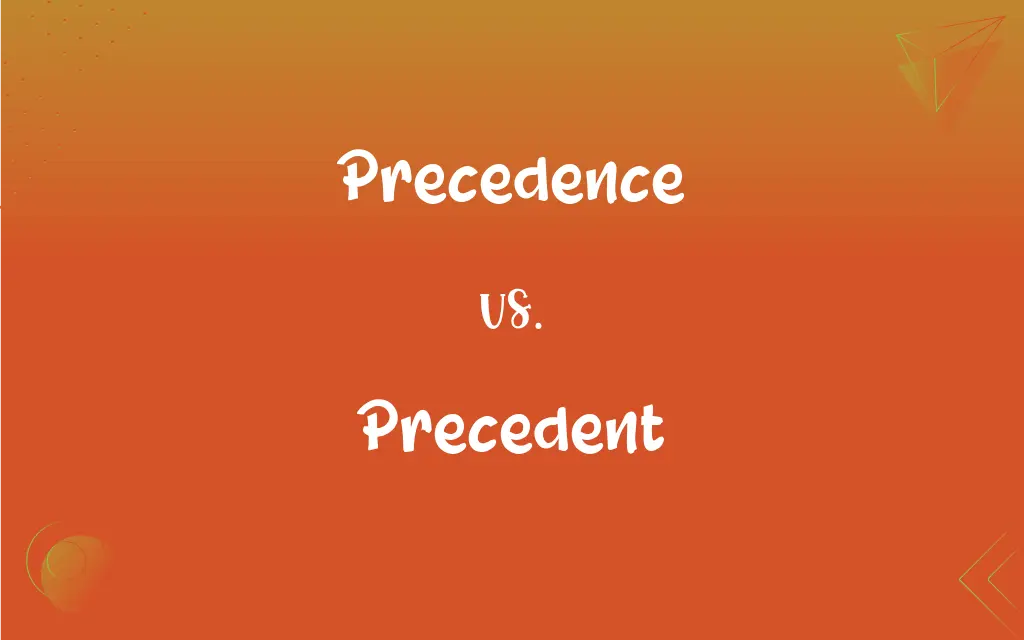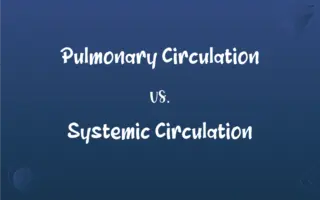Precedence vs. Precedent: What's the Difference?
Edited by Aimie Carlson || By Harlon Moss || Updated on October 22, 2023
Precedence refers to priority in order or importance, while precedent refers to an earlier event or action serving as an example or rule.

Key Differences
Precedence and precedent are two English terms with distinct meanings, yet they are commonly misused due to their phonetic similarity. Precedence, derived from the verb "precede," relates to the order of importance or sequence. It can denote the superiority of one thing over another in terms of significance or rank. On the other hand, precedent is associated with legal and non-legal scenarios, referring to an earlier instance or event used as a reference or guide.
In the realm of computer science, precedence concerns the hierarchy or priority of operations. For instance, in mathematics, multiplication takes precedence over addition. Contrastingly, precedent focuses on past instances that serve as models. In legal circles, a ruling in a prior case can be taken as a precedent to guide judgments in similar cases in the future.
Social hierarchies, too, involve the term precedence. For instance, in ceremonial events, one dignitary might be given precedence over another based on rank or status. Precedent, in a social context, could relate to previously established customs or traditions. For example, a precedent might be set in a community when an event is celebrated in a particular way, influencing subsequent celebrations.
Within the framework of everyday life, precedence might dictate the order in which tasks are tackled based on urgency. Daily chores, work assignments, or even recreational activities can be prioritized based on their precedence. Meanwhile, precedent in daily life may involve looking at past actions or decisions as a guide. For instance, if hosting a party in a certain way was successful before, it sets a precedent for future gatherings.
In summary, while both precedence and precedent can relate to order and sequence, precedence leans more towards priority and rank, and precedent leans towards historical events or actions used as references or models.
ADVERTISEMENT
Comparison Chart
Definition
Priority in order or importance
An earlier event or action serving as an example or rule
Field of Use
Often in hierarchy and ordering
Common in legal contexts and as reference for subsequent actions
Derived From
The verb "precede", meaning to come before
From Latin "praecedent", meaning going before
Example Scenario
Ranking in a hierarchy
Legal decisions used to guide future cases
Synonyms
Priority, primacy
Model, example, guide
ADVERTISEMENT
Precedence and Precedent Definitions
Precedence
An order to be followed in ceremonies.
The protocol outlines the precedence during the royal procession.
Precedent
An act or instance that may be used as a reason in subsequent similar situations.
The city's policy created a precedent for neighboring regions.
Precedence
The condition of being more important than something else.
Safety takes precedence over convenience in engineering designs.
Precedent
An earlier event or action that serves as a guide.
The court's decision set a precedent for future cases.
Precedence
The established order of precedence.
In military ranks, a general has precedence over a colonel.
Precedent
An instance that may be used as an example in dealing with subsequent instances.
The manager's leniency set a dangerous precedent.
Precedence
The fact of coming before something in time or order.
The main event's precedence was the opening act.
Precedent
A previously set example or pattern.
Breaking curfew without consequences might set a bad precedent for the teenager.
Precedence
Priority given based on importance.
In the meeting, urgent matters took precedence over other topics.
Precedent
A legal decision serving as an authoritative rule.
Lawyers often refer to past precedents when arguing a case.
Precedence
The fact, state, or right of coming before in time, order, or position
Applications arriving first will receive precedence in processing.
Precedent
An act or instance that may be used as an example in dealing with subsequent similar instances.
FAQs
What is precedence in a simple term?
Precedence refers to priority or importance in order.
Which term relates more to the concept of order or rank?
Precedence.
How is the word precedent commonly used in the legal field?
It refers to a previous legal decision used as a standard in subsequent cases.
What’s the root of the word precedent?
It's derived from Latin "praecedent", meaning going before.
Can societal norms be a form of precedence?
Societal norms typically set precedents, but they don't define precedence.
Can the actions of a prominent figure set a precedent?
Yes, their actions can often serve as models for others.
Can everyday decisions set a precedent?
Yes, any past decision can potentially influence future choices.
What's the difference between precedence and precedent in one line?
Precedence refers to priority in order, while precedent refers to an earlier event or rule.
Can you give an example where precedence is applied in computer science?
In arithmetic operations, multiplication has precedence over addition.
Does precedent always influence future decisions?
Not always, but it often serves as a guide or reference.
Can precedence be overruled?
Depending on the context, yes. For example, an urgent task can overrule regular precedence.
Do the two terms have any connection in meaning?
Both can relate to order or sequence, but they are used in different contexts.
Can a precedent be non-legal?
Yes, it can be any past event or action used as a reference or guide.
Are all precedents binding?
No, only certain legal precedents are binding, others are persuasive.
Is precedence always static?
No, the precedence of tasks or individuals can change based on context.
How is precedence determined in a ceremony?
It's often based on protocol, rank, or status.
Can precedents be overruled in law?
Yes, higher courts can overrule the precedents set by lower courts.
Can one thing have precedence over multiple others?
Yes, for instance, a CEO might have precedence over several department heads.
Are there any synonyms for precedent?
Yes, such as model, example, or guide.
Is precedence always obvious?
Not always, sometimes it requires context or knowledge of certain rules.
About Author
Written by
Harlon MossHarlon is a seasoned quality moderator and accomplished content writer for Difference Wiki. An alumnus of the prestigious University of California, he earned his degree in Computer Science. Leveraging his academic background, Harlon brings a meticulous and informed perspective to his work, ensuring content accuracy and excellence.
Edited by
Aimie CarlsonAimie Carlson, holding a master's degree in English literature, is a fervent English language enthusiast. She lends her writing talents to Difference Wiki, a prominent website that specializes in comparisons, offering readers insightful analyses that both captivate and inform.































































